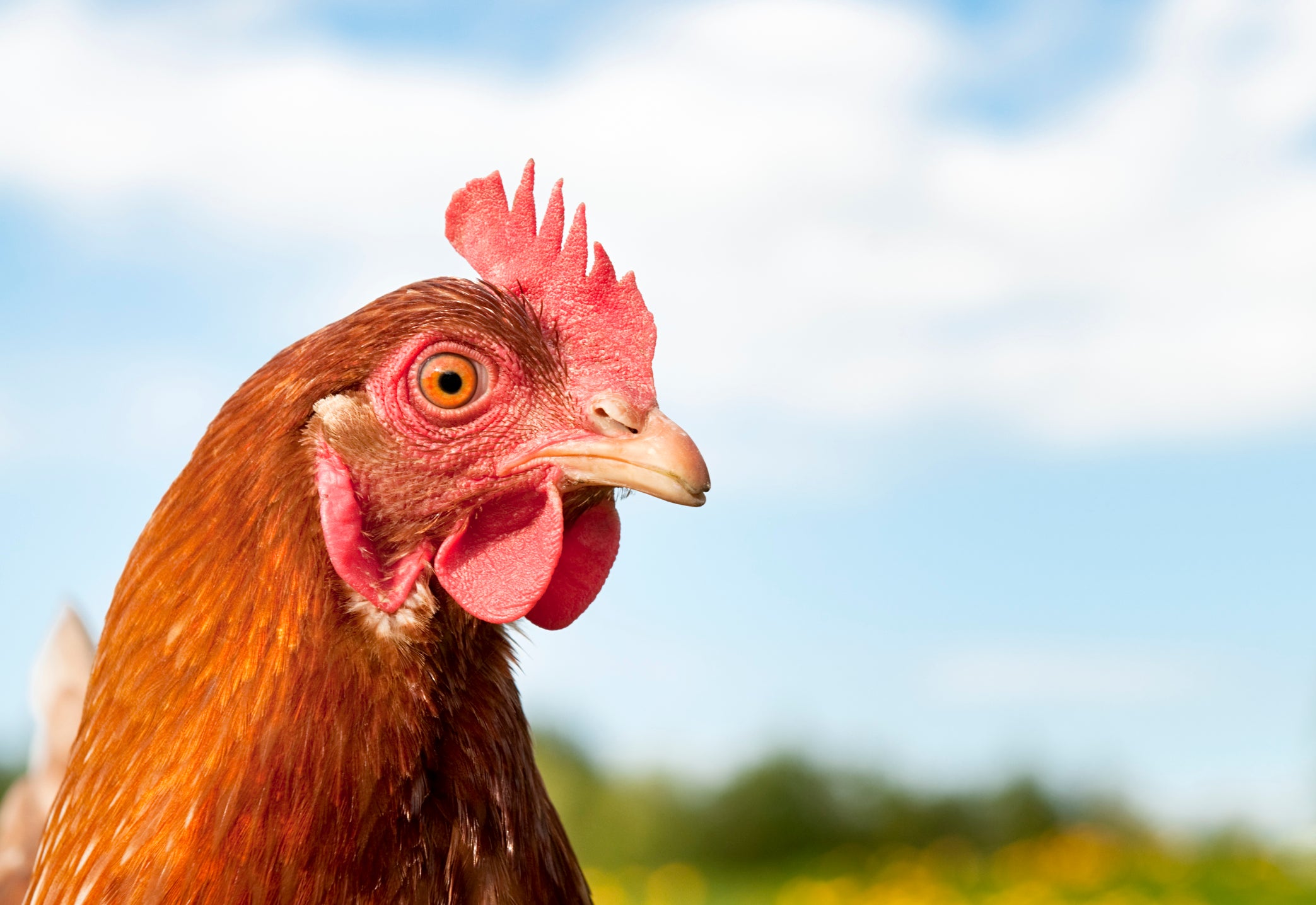The chicken scandal hiding in plain sight: Why supermarkets won’t stop selling Frankenchickens
Despite promising better animal welfare, most UK retailers still sell chickens bred to grow so fast they can barely walk. As Co-op members prepare to vote on change, Hannah Twiggs asks: how did we end up here – and what’s really stopping supermarkets from doing better?


Right now, millions of birds are hurting, flapping around, confused, unable to get away from the suffering, which is hardcoded into their DNA,” wrote Chris Packham, in a blistering open letter to Co-op CEO Shirine Khoury-Haq earlier this month. It was not, to put it mildly, your typical AGM correspondence. At issue is the retailer's continued sale of so-called “Frankenchickens” – fast-growing chicken breeds that reach slaughter weight in just 35 days. These birds have been selectively bred to prioritise speed over strength, often outgrowing the limits of their own skeletal and organ systems. As Packham puts it, these animals are “bred to grow so unnaturally fast that they suffer from painful lameness, organ failure and bone deformities”.
In May, Co-op members will vote on an advisory motion to end the sale of Frankenchickens and adopt the Better Chicken Commitment (BCC), a higher welfare standard that mandates slower-growing breeds, more space and natural light. The vote follows years of campaigning by The Humane League UK, and a previous 2023 member resolution where 96 per cent of voters backed the transition.
Co-op responded by giving its birds 20 per cent more space, but declined to change the breed – the key factor in Frankenchickens’ suffering. This formed part of its “Space to Thrive” programme, which Co-op later extended to breaded and ready-to-cook chicken products – a move it says puts it ahead of most retailers.
“Co-op without its values is nothing,” Packham warned. “Its standards should reflect its principles, and it shouldn’t be sucked into a race to the bottom, vying with supermarkets less interested in ethics.”
According to The Humane League's 2024 State of the Chicken Industry report, Co-op is far from alone in failing to meet BCC standards. Of the UK's 10 major supermarkets, only Marks & Spencer and Waitrose have fully complied. Tesco, Morrisons, Lidl, Sainsbury’s, Aldi and Co-op have reduced stocking densities, but continue to use fast-growing breeds. Asda and Iceland have made no meaningful welfare commitments at all.
Meanwhile, more than 1.5 million chickens die prematurely on UK farms each week. The vast majority – more than 90 per cent of broilers – are still fast-growing breeds. The Humane League characterises this as “an unfolding animal welfare crisis” hiding in plain sight on supermarket shelves.
A spokesperson for the Co-op told The Independent: “Animal welfare is extremely important to us, and we work hard to ensure all the animals in our supply chain are looked after. All Co-op fresh chicken is 100 per cent British and exceeds Red Tractor standards, which places us at the forefront of chicken welfare, which is where our member-owners, colleagues and customers expect us to be.”
Katie Ferneyhough, head of programmes at The Humane League UK, said the Co-op could “no longer ignore the cruelty and hypocrisy of keeping Frankenchickens”, adding that while the retailer once led on animal welfare, its current stance concerning chicken leaves it trailing competitors and urged the board to commit to a clear roadmap for ending the use of fast-growing breeds.
Which raises a pressing question: if consumers care so much about animal welfare – and polling says they do – why are these birds still being sold?
The problem with labels
Part of the answer lies in labelling. Most consumers would struggle to define what “Frankenchicken” means, let alone how to spot one in the chiller aisle.
The result is what campaigners call “welfare washing”: marketing that conjures images of clucking, free-roaming hens, while the reality is far closer to an industrialised treadmill of suffering. A chicken might be labelled “British” or even “high welfare” while still spending its short life inside a dimly lit shed, its body growing faster than its organs can cope.
For Co-op shoppers, this contradiction is particularly stark. The retailer proudly touts its ethical credentials, having led on welfare for pigs, egg-laying hens and even shrimp. Yet according to the Humane League’s report, 98 per cent of its chickens are still Frankenchickens.
Claire Williams, campaigns manager at The Humane League UK, puts it bluntly: “It is time for the Co-op to take a stance against the very forms of factory farming and give their chickens better lives, in the name of democracy and decency.”
Waitrose and the welfare business case
Some supermarkets are proving it can be done. Waitrose recently became the first in the UK to go beyond the BCC for all its own-brand chicken.
“We know our customers want the highest welfare standards for farm animals,” the retailer said in a statement. “This is why, unlike many other retailers, we only offer chicken which has been bred to higher welfare standards across all our own-brand fresh chicken. We know it is the right thing to do for our farmers, our customers and for the animals.”
That message is already resonating. According to the Humane League, M&S saw a 33 per cent increase in chicken sales after fulfilling its BCC pledge. It turns out ethics and economics aren’t always at odds.
The legal (and moral) line
This momentum coincides with a significant legal development. In December 2024, the UK Court of Appeal dismissed The Humane League’s legal bid to ban Frankenchickens outright, but delivered a potentially seismic clarification: farming animals bred to suffer is likely already unlawful under the Animal Welfare Act.
“If the evidence were to establish that the breed of broiler chicken used by a producer suffers or is likely to suffer as a result of its genetic makeup, then keeping such animals would be a criminal offence,” wrote Lord Justice Males.
In other words, there may be legal consequences for continuing to raise these birds, even without new legislation. Campaigners believe this opens the door to private prosecutions and further scrutiny of supply chains.
From Frankenchicken to chlorine
If this seems like a particularly British scandal, it’s worth remembering the looming spectre of chlorinated chicken. The term became shorthand for lowered food standards during Brexit trade negotiations with the US. Chlorine-washed chicken isn’t inherently dangerous – it’s widely consumed in America – but critics argue it masks hygiene failings and abysmal welfare conditions.
In that sense, the Frankenchicken debate is chlorinated chicken’s domestic cousin: a question of whether the UK is willing to accept cheaper meat at the cost of transparency, decency and consumer trust.
The UK government has repeatedly pledged not to weaken food standards in post-Brexit trade deals, but campaigners remain wary. If the US pushes to include poultry in future trade agreements, will British farmers – and their birds – be protected?
The shopper’s dilemma
All of this puts shoppers in an impossible position. Most care about animal welfare, according to polling. But many don’t have the time or expertise to decipher vague labelling, and in a cost-of-living crisis, price often wins.
Supermarkets have leaned heavily on messaging like “affordable for all”, but as Packham says, “Principles aren’t principles if they don’t cost you anything.”
A family browsing the chiller aisle might assume “high welfare” means something concrete. But unless they’re reading the fine print on breed, space and light, they may still be taking home the very products they’re trying to avoid.
So, where does that leave the concerned consumer? Perhaps more confused than ever. If the Co-op, of all retailers, is dragging its feet, what hope is there for meaningful reform?
Come May, Co-op members will have their say. But the vote is only one piece of the puzzle. As the Court of Appeal ruling, supermarket scorecards and Packham’s words all remind us, the fight for better chicken is a fight for better standards, full stop.
And if we can’t even do right by a roast dinner, what does that say about the values we’re really putting in our shopping baskets?


Join our commenting forum
Join thought-provoking conversations, follow other Independent readers and see their replies
Comments